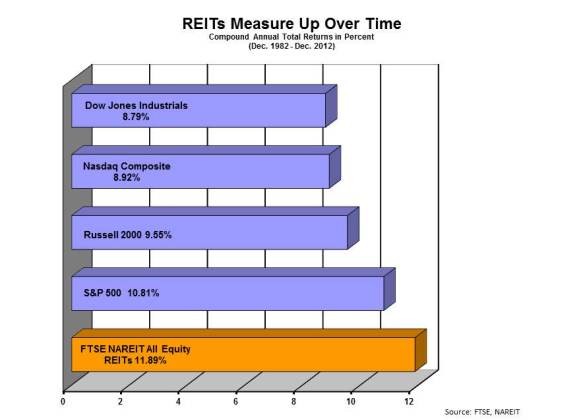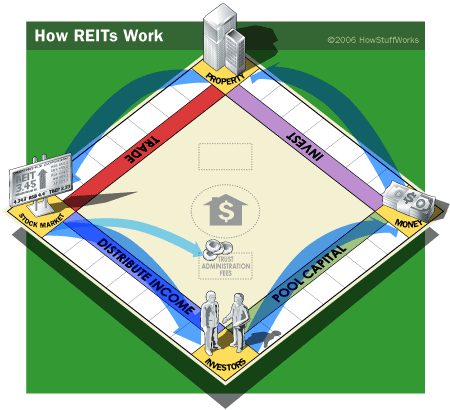REIT (Real Estate Investment Trust) Investing
Post on: 31 Май, 2015 No Comment

REITs or Real Estate Investment Trusts investments are an alternative to purchasing real estate directly. Its owning real estate without the hassle. A REIT is similar to owning a stock, where it can be publicly traded on the stock market. There are also REITs mutual funds and ETFs that diversify by investing in many individual REITs.
By tax law, REITs have to return 90% of their income to their shareholders. By this setup many REITs have attractive yields. On average a REIT yields around 5 6%. Unlike dividend stocks which are currently taxed at maximum of 15%, REITs are taxed at your ordinary income rate. So in many cases you are best to invest in REITs in tax differed accounts like an IRA or 401(k) to minimize taxes.
Just like real estate, REITs can invest in many categories, and/or many geographical regions. Real estate is typically broken down into these categories:
- Industrial and Office
- Retail
- Residental
- Lodging and Resorts
- Health Care
- Self Storage
- Speciality

REIT Advantages
- Low Amount Needed To Invest You dont need a lot of money to start investing in a REIT. Owning a REIT index fund gives you exposure to the real estate asset class with very little money.
- Passive Investment Directly owning a property is a business and is not true passive investment like a REIT investment
- Low Correlation REITs historically have a low correlation to other asset classes. When stocks zig, REITs typically zag.
- Liquidity Unlike owning a property directly, investing in a REIT can be a quick enter and quick exit if youve made a mistake. Traditional real estate has a long enter and exit process, so your investment isnt liquid.
REIT Disadvantages
- No Tax advantages Unlike owning a property, you do not have tax advantages, such as depreciation.
- Limited Tax To Differed Accounts Dividend income is taxed at ordinary income. While you can put a REIT into a taxable account, your dividend is significantly reduced.
- Less Control Unlike owning a property yourself, you have less control over the management and profit.
- Dividends Not 100% Guaranteed Dividends can decrease and are not 100% guaranteed like we saw during the 2008-09 downturn. So in this respect it is not like owning a bond.














